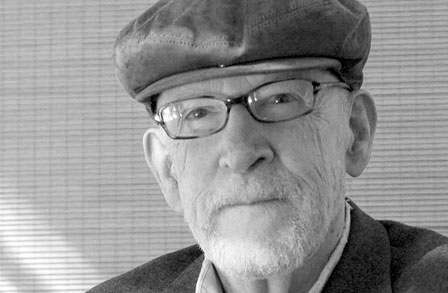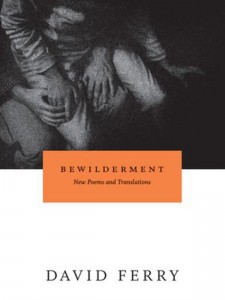David Ferry: National Book Award winner
Where did you go to, when you went away?
It is as if you step by step were going
Someplace elsewhere into some other range
Of speaking, that I had no gift for speaking,
Knowing nothing of the language of that place
To which you went with naked foot at night
Into the wilderness there elsewhere in the bed,
Elsewhere somewhere in the house beyond my seeking.
I have been so dislanguaged by what happened
I cannot speak the words that somewhere you
Maybe were speaking to others where you went.
Maybe they talk together where they are,
Restlessly wandering, along the shore,
Waiting for a way to cross the river.
—”That Now are Wild and Do Not Remember,” from Bewilderment: New Poems and Translations
In 1983, the Phoenix Poets series published its inaugural volume—Strangers: A Book of Poems, by longtime Wellesley College professor David Ferry. Strangers was Ferry’s second book of his own poems; his first published work was a study on Wordsworth (The Limits of Mortality, 1959), soon followed by his debut collectionOn the Way to the Island (1960). What had Ferry been doing the past two decades? And what sort of risk might be associated with launching a series on a follow-up collection brewing for more than 20 years?
These questions fade. Ferry taught at Wellesley for thirty-seven years, before retiring as the Sophie Chantal Hart Professor Emeritus of English; he has since been elected a fellow of both the American Academy of Arts and Sciences and the Academy of American Poets. He has gone on to garner the Lenore Marshall Poetry Prize from the Academy of American Poets, the Rebekah Johnson Bobbitt National Prize for Poetry from the Library of Congress, the Harold Morton Landon Translation Award, the Teasdale Prize for Poetry, the John Simon Guggenheim Foundation Fellowship, the Ingram Merrill Award, the William Arrowsmith Translation Prize from AGNI magazine, and the Ruth Lilly Poetry Prize.
Last night, Ferry’s world came full circle, when his Phoenix Poets collection Bewilderment: New Poems and Translations won the National Book Award.
Perhaps its worth pointing out, though widely known, that Ferry is also one of our most acclaimed translators of classical languages. Among his translations, many of which are interspersed in his poetry collections, are Gilgamesh, the Odes and Epistles of Horace, and the Eclogues and Georgics of Virgil; he is currently at work on translation of the Aeneid.
There is much to say about Ferry’s body of work—it is sparse and eloquent, yet expansively self-aware; it is charged with a kind of cause and effect that somehow always engages the present, even when that present willfully elides with nostalgia or prognostication; it is sometimes cranky with its own attachments and observations, but never cantankerous; and it’s almost always involved in that acute practice of translation, whether from language to language or gesture to word.
In the midst of the AAUP’s inaugural University Press Week, we couldn’t be more pleased for Ferry—and proud of how the work done by university presses continues to matter.

